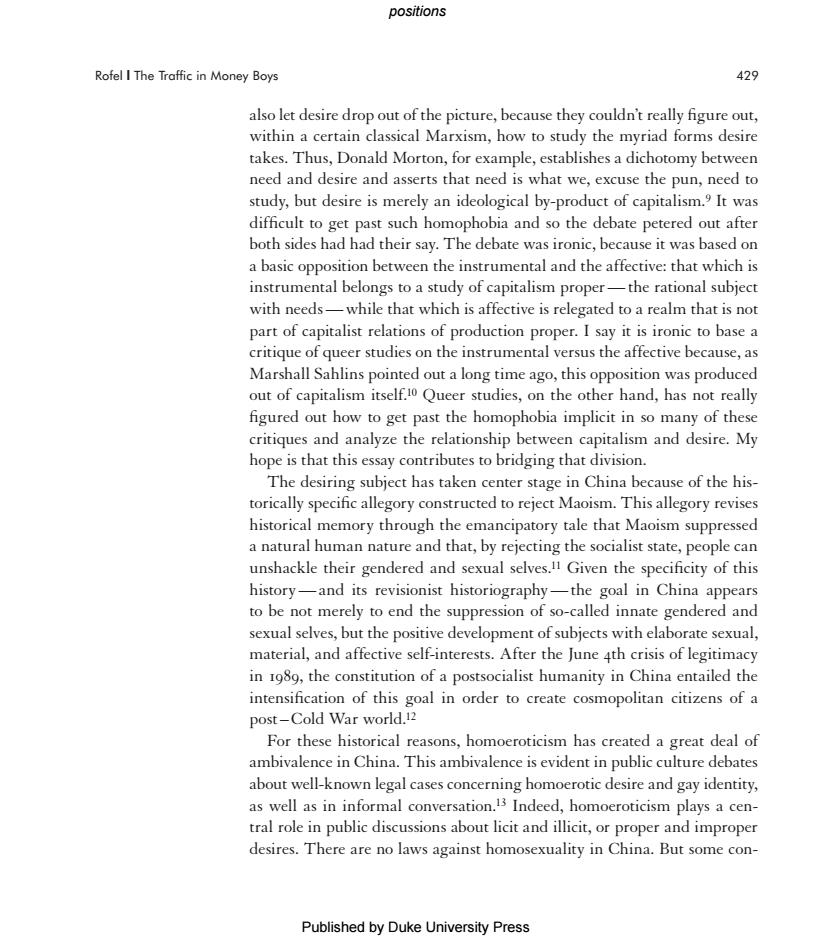正在加载图片...

positions Rofel I The Traffic in Money Boys 429 also let desire drop out of the picture,because they couldn't really figure out, within a certain classical Marxism,how to study the myriad forms desire takes.Thus,Donald Morton,for example,establishes a dichotomy between need and desire and asserts that need is what we,excuse the pun,need to study,but desire is merely an ideological by-product of capitalism.It was difficult to get past such homophobia and so the debate petered out after both sides had had their say.The debate was ironic,because it was based on a basic opposition between the instrumental and the affective:that which is instrumental belongs to a study of capitalism proper-the rational subject with needs-while that which is affective is relegated to a realm that is not part of capitalist relations of production proper.I say it is ironic to base a critique of queer studies on the instrumental versus the affective because,as Marshall Sahlins pointed out a long time ago,this opposition was produced out of capitalism itself.0 Queer studies,on the other hand,has not really figured out how to get past the homophobia implicit in so many of these critiques and analyze the relationship between capitalism and desire.My hope is that this essay contributes to bridging that division. The desiring subject has taken center stage in China because of the his- torically specific allegory constructed to reject Maoism.This allegory revises historical memory through the emancipatory tale that Maoism suppressed a natural human nature and that,by rejecting the socialist state,people can unshackle their gendered and sexual selves.l1 Given the specificity of this history-and its revisionist historiography-the goal in China appears to be not merely to end the suppression of so-called innate gendered and sexual selves,but the positive development of subjects with elaborate sexual, material,and affective self-interests.After the June 4th crisis of legitimacy in 1989,the constitution of a postsocialist humanity in China entailed the intensification of this goal in order to create cosmopolitan citizens of a post-Cold War world.12 For these historical reasons,homoeroticism has created a great deal of ambivalence in China.This ambivalence is evident in public culture debates about well-known legal cases concerning homoerotic desire and gay identity, as well as in informal conversation.3 Indeed,homoeroticism plays a cen- tral role in public discussions about licit and illicit,or proper and improper desires.There are no laws against homosexuality in China.But some con- Published by Duke University PressRofel ❘ The Traffic in Money Boys 429 also let desire drop out of the picture, because they couldn’t really figure out, within a certain classical Marxism, how to study the myriad forms desire takes. Thus, Donald Morton, for example, establishes a dichotomy between need and desire and asserts that need is what we, excuse the pun, need to study, but desire is merely an ideological by-product of capitalism.9 It was difficult to get past such homophobia and so the debate petered out after both sides had had their say. The debate was ironic, because it was based on a basic opposition between the instrumental and the affective: that which is instrumental belongs to a study of capitalism proper— the rational subject with needs— while that which is affective is relegated to a realm that is not part of capitalist relations of production proper. I say it is ironic to base a critique of queer studies on the instrumental versus the affective because, as Marshall Sahlins pointed out a long time ago, this opposition was produced out of capitalism itself.10 Queer studies, on the other hand, has not really figured out how to get past the homophobia implicit in so many of these critiques and analyze the relationship between capitalism and desire. My hope is that this essay contributes to bridging that division. The desiring subject has taken center stage in China because of the historically specific allegory constructed to reject Maoism. This allegory revises historical memory through the emancipatory tale that Maoism suppressed a natural human nature and that, by rejecting the socialist state, people can unshackle their gendered and sexual selves.11 Given the specificity of this history— and its revisionist historiography— the goal in China appears to be not merely to end the suppression of so-called innate gendered and sexual selves, but the positive development of subjects with elaborate sexual, material, and affective self-interests. After the June 4th crisis of legitimacy in 1989, the constitution of a postsocialist humanity in China entailed the intensification of this goal in order to create cosmopolitan citizens of a post –Cold War world.12 For these historical reasons, homoeroticism has created a great deal of ambivalence in China. This ambivalence is evident in public culture debates about well-known legal cases concerning homoerotic desire and gay identity, as well as in informal conversation.13 Indeed, homoeroticism plays a central role in public discussions about licit and illicit, or proper and improper desires. There are no laws against homosexuality in China. But some conpositions Published by Duke University Press